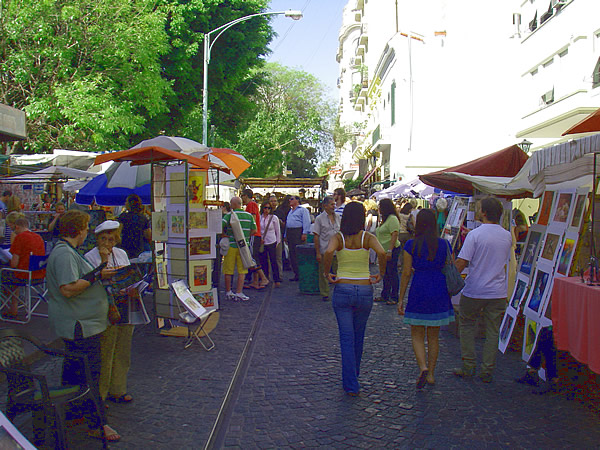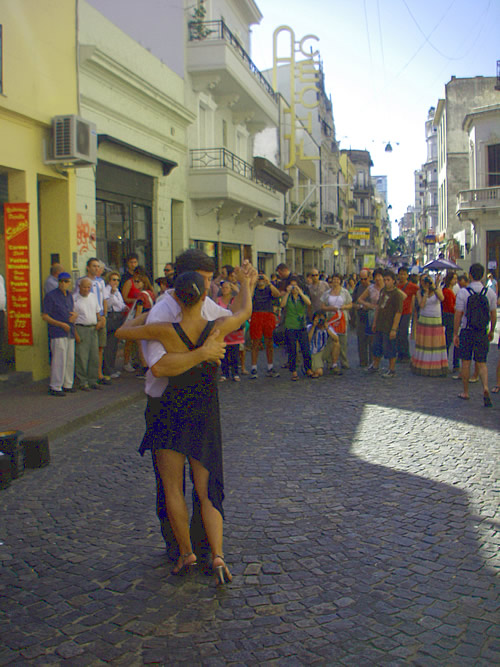Jobs in Buenos Aires
How to Live, Teach and Freelance to Enjoy the City and Pay Bills
Article and photos by Joshua Rapp Learn

|
|
A market scene in Buenos Aires.
|
It was time to settle down and find something worthwhile to do with myself. I had just traveled 3,000 kilometers south across the Patagonian steppe with my girlfriend to reach Ushuaia, the end of the world, as quickly and as cheaply as possible. The operation had involved a mixture of hitchhiking and overnight buses and had taken a little over two weeks, which included sightseeing stops at the caves of Las Grutas, the marine life-packed Puerto Madryn, and the Perito Moreno Glacier — one of infrequent chunks of ice that is still advancing despite the effects of Climate Change causing others to recede. Aside from long hours walking along deserted highways, the voyage had been spectacular. However, the south of Argentina had been expensive. Once back in Buenos Aires, it took less than a week of lying about on my girlfriend’s couch for her to inform me that it was time to move out and get a job.
Starting a Journalism Job Search
Perhaps still high on the sense of accomplishment from hitchhiking to the southernmost city in the world, I felt capable of doing anything. I had also published several travel articles in newspapers back home, so I had some clippings and a little writing experience. Besides that, I had recently applied for a master’s degree in journalism at several universities. I was keen to gain a little hands-on experience while I waited to hear back from the universities. I began by searching the internet and travel guides for English publications based in Buenos Aires.
Sometimes, it is easier to get into the freelance writing market outside of English-speaking countries since there is less competition. Many expatriate newspapers in Latin America often are searching for fresh material. The best way to contact information the editor is with a query letter including your previous writing samples. Even better, propose your own idea for a possible article. Just be careful to analyze the newspaper to see whether they tend to publish freelancer’s work. You can tell by looking at the authors’ sources or bios. Suppose most articles specify “Associated Press” without a specific author at the beginning or end. In that case, the newspaper probably only buys articles from large syndicates. Newspapers that list most of their articles as being written by “staff reporters” are similarly challenging to break into. There are exceptions to every rule, of course, and the proper query and experience may land you work anywhere.
Journalism Job Found
My search took only a few days and produced reasonably quick results. Almost immediately, I discovered The Buenos Aires Herald on a newsstand and mailed off a letter of introduction. Several days passed, and I waited for a response before I took a closer look at the newspaper. When I did, I noticed most articles were bought from a mixture of English and American newspapers. I immediately realized that I was waiting in vain.
In San Telmo, the archetypal romantic porteño neighborhood, I encountered a second-hand English bookstore that carried copies of another English newspaper, The Argentimes. I brought a copy back to the hostel where I was staying and read it from cover to cover. Within an hour, I had sent a cover letter complete with clippings of a few of my previous publications. A week later, I discussed article ideas with the editor over a mate cocido — a characteristically Argentine tea.
Less than a month into my stay in Buenos Aires, I already had my first assignment — I was to write an article about hitchhiking across Patagonia. To find a little privacy, I moved from my hostel to a cheap hotel by the famous Plaza Dorrega. As I began working on my article, the sound of tango wafted through my open window, instilling my writing with the peculiarly “dramatic” characteristic I had come to recognize as distinctly porteño.
Indeed, San Telmo seemed the perfect place to begin my journalism career. With its Bohemian edge, it came as no surprise that the neighborhood was one of the purported birthplaces of tango. Cobblestone bricks were occasionally interspersed with plaques commemorating locals who were “disappeared” during the military dictatorship in the 1970s. Many of the streets were lined with cafes and antique markets, and a Sunday fair was a constant reminder of the city’s endemic sense of nostalgia.

|
|
Tango dancers in Buenos Aires.
|
English Teaching Jobs
Unfortunately, writing did not pay all the bills. However, it provided a great way to get some experience. I began firing resumes to every English teaching academy I could track down in the province.
Although there are numerous English teaching academies, do not expect to walk right into a full-time teaching job. Many jobs are with agencies that send teachers out to residential addresses. Often, they will start you out with a maximum of a few weekly classes for a trial period. If you stick around and if they are satisfied with your teaching, they will begin to offer you more classes as they get new students. They pay decently per lesson, but one of the problems with this kind of work is that you will have to travel around the city to give individual lessons, often out in distant suburbs. Suppose you are going through one of these institutions. In that case, you should be prepared to support yourself for several months before you begin making enough to cover your living expenses. In the beginning, you may struggle to make ends meet. Yet, with time, you should accumulate enough lessons to provide a reasonable income.
Argentine job search engines like Zona Jobs and Computrabajo are good places to start. However, it often helps to find the address of a particular English academy, show up looking sharp, and ask to speak to someone in charge. It is good to meet people face to face. However, you may limit your search to the web. In that case, it is also a good idea to send your resume to any agency whose contact info you discover. You never know when an academy is searching for extra help.
Make sure to get a cell phone before you begin your search. The high number of pickpockets on the trains and subways has created one positive benefit — it is pretty cheap to get a hold of a second-hand phone. Hawkers sell new phone chips right on the trains, often for less than three dollars — this is possibly why the number of registered cell phone numbers is nearly twice Argentina’s population. You will need to buy phone cards from a corner store, and the credit fades if you make a lot of calls, but it is an excellent way to at least establish a reliable contact. Be cautioned that from a cell phone, it is usually cheaper to call another cell phone than to call a fixed phone, and vice versa. When searching for apartments and jobs, I often used a call center to phone fixed lines. You will see them everywhere; they are called locutorios.
Finding Apartments
With persistence, you can find something in or around San Telmo for US$300 to US$500. But be careful to check out the neighborhood before making a decision. Although Buenos Aires is generally relatively safe, many nicer neighborhoods are surrounded by more dangerous areas. If the rent of a place seems too cheap to be true, it probably is. A good way to familiarize yourself with the city is to ride the buses instead of the subways when moving around. Although greater Buenos Aires’ bus system is incredibly complex, with hundreds of different bus lines crossing through the city and suburbs, they have all been organized into a pocket-sized directory. The Guía T comes complete with maps detailing bus routes and even pictures of the number, color, and shape of each bus line to help you distinguish between the often chaotic mix of diesel-fuelled monsters that tear through every other street in apparent disdain of the need for mufflers. You can pick up a copy of the “T Guide” at most newsstands and corner stores. The alphabetized list of street names and their corresponding location on the map is a must when searching for addresses.
Like anywhere, searching for a shared place is often the cheapest option, and websites such as Craigslist offer plenty of advertisements. The latter is good because it is often used by other expats searching for roommates. In the meantime, San Telmo is packed with hostels and cheap hotels. Many hostels in Buenos Aires offer discounts if you pay in advance for more extended periods — especially during the off-season.
Conclusion
Over a period of six months, I was offered lessons teaching with several different academies. Although I already had a year of experience teaching English in Japan, it did not provide me much advantage over others who were also job hunting. Several people staying in the same hostel began teaching lessons despite their lack of experience. A TEFL certificate certainly helps a ton, as certificates are more universally expected. I finally wrote several long articles for The Argentimes, complete with photos, and put together a great set of clippings for my portfolio.
|
